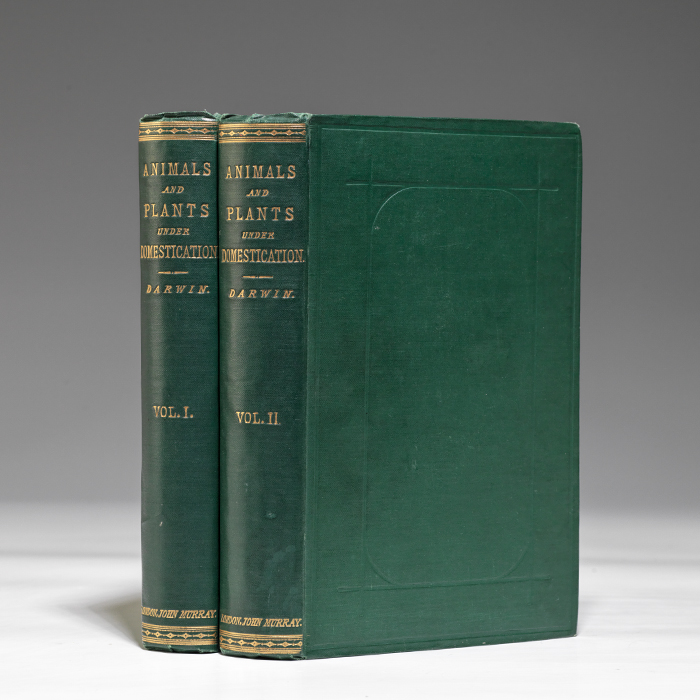
"WITH MR. C. DARWIN'S COMPLIMENTS & THANKS": DARWIN'S VARIATION UNDER DOMESTICATION, VERY RARE PRESENTATION-ASSOCIATION FIRST EDITION, WITH PRESENTATION NOTE IN DARWIN'S HAND LAID IN
DARWIN, Charles. The Variation of Animals and Plants under Domestication. London: John Murray, 1868. Two volumes. Octavo, original green cloth gilt, black endpapers. Housed in a custom chemise and clamshell box. $59,000.
Very rare presentation-association first edition, first issue, of Darwin’s hypothesis of pangenesis, with an autograph presentation note in Darwin's hand, on his letterhead stationery, that reads: "Dec. 24, with Mr. C. Darwin's compliments & thanks." The recipient, Joseph Prestwich, was a renowned geologist and Darwin's Kentian neighbor, friend, and correspondent. Presentation copies of Darwin's works are almost always found with an inscription in a secretarial hand; presentations in Darwin's actual hand, as here, are quite uncommon. A lovely copy in the original cloth.
This work "took up in detail that subject which had been confined to one chapter of the Origin. It contained [Darwin's] hypothesis of pangenesis, by means of which he tried to frame an explanation of hereditary resemblance, inheritance of acquired characters, atavism, and regeneration. It was a brave attempt to account for a number of phenomena which were beyond the bounds of scientific knowledge in his day, such as fertilization by the union of sperm with egg, the mechanism of chromosomal inheritance, and the development of the embryo by successive cell division. His hypothesis of pangenesis could not therefore give a permanently acceptable account of the multitude of phenomena it was designed to explain. It was, however, a point of departure for particulate theories of inheritance in the later 19th century" (DSB). First issue, in first issue binding , with errata points specified in Freeman; the first issue of 1500 copies sold out within a week of its publication. With four pages of advertisements dated December 1866 in both Volume I and II, and an additional leaf of advertisements dated February 1868 in Volume II.
Freeman 877. Garrison & Morton 224.1. See Norman 597.
Bookplate of recipient Joseph Prestwich (1812-96). Darwin wrote on a number of occasions to Prestwich, most notably after the publication of The Origin of Species, when he sought Prestwich's "general criticisms": "I have always admired your various memoirs so much that I should be eminently glad to receive your opinion, which might be of real service to me" (12 March 1860). Prestwich was a wine merchant and avid geologist who was not able to devote himself fully to science until he retired from business in 1872; in 1874 he was offered and accepted the chair of geology at Oxford, a post that he held until 1888. While most of his researches were strictly geological, he did oversee and publish the results of an important excavation of human and animal remains: "In 1858 Prestwich became a member of the committee set up by the Geological Society to oversee the excavation of Brixham cave in south Devon, an untouched site which it was hoped might reveal new information on Pleistocene stratigraphy and on the antiquity of the human race. Although worked flints were found associated with the bones of extinct animals in the cave, Prestwich was not convinced until he and John Evans visited Boucher de Perthes in Abbeville, northern France, where he saw flint implements in bone-bearing gravels, and realized that humans had indeed coexisted with elephants and other Pleistocene mammals. These conclusions, which were accepted by Lyell and others, were published in Philosophical Transactions of the Royal Society in 1861. Prestwich was awarded the royal medal of the Royal Society in 1865 in recognition of the importance of this work. Hugh Falconer, who had been Prestwich's companion throughout the Brixham and Abbeville work, died in 1865, and the task of writing up a report on the Brixham cave excavation devolved to Prestwich. He eventually completed it in 1872, and it was published by the Royal Society in Philosophical Transactions in 1873" (ODNB). "Falconer and Prestwich were among the first to uncover Stone Age tools—worked flint—that seemed to push the first appearance of human beings back to a time contemporaneous with extinct fossil mammals… Lyell summarized the results for his British Association audience, which also provided him with a suitable opening for a few words on Darwin" (Browne, Charles Darwin, 80). During these years, Prestwich and his sister Isabella Civil Prestwich "had built a house high on the downs above the village of Shoreham in Kent in 1865, and this, Darent Hulme, now became his home" (ODNB), making him a neighbor of Darwin's, with their homes roughly eight miles from each other.
Faint fold lines to stationery. A hint of rubbing to corners. Very nearly fine in fresh and bright original cloth. A most desirable presentation-association copy.